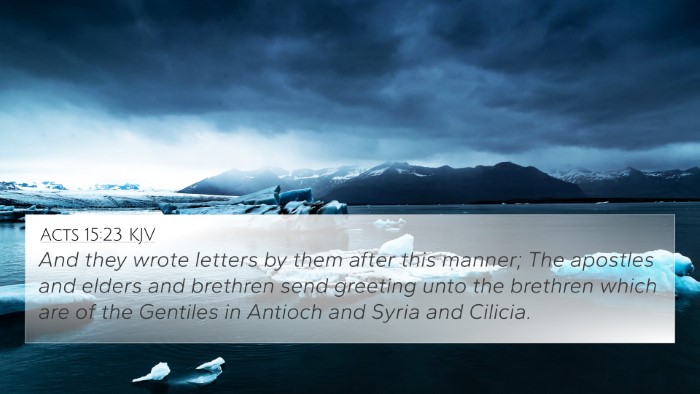Understanding Acts 23:26
This verse is part of the narrative depicting Paul's defense before the Roman authorities, demonstrating his rights as a citizen and the layers of both political and religious conflict surrounding him. In Acts 23:26, we see the letter that Claudius Lysias wrote to Governor Felix, indicating the heightened tension and the need for authority intervention.
Verse:
Acts 23:26: “Claudius Lysias, unto the most excellent governor Felix, sendeth greeting.”
Meaning and Insights
The verse serves a vital role in the narrative, linking historical and spiritual themes. Here are some combined insights from renowned commentaries:
- Matthew Henry: Henry emphasizes the political ramifications of Paul's situation. By stating his Roman citizenship, Paul asserts his rights, and Lysias’s letter implies the seriousness with which the authorities must treat Paul’s case.
- Albert Barnes: Barnes notes that the letter symbolizes the intersection of divine providence and human authority. Paul is not only protected because of his citizenship but is positioned to further the Gospel message through his trials.
- Adam Clarke: Clarke brings attention to the salutation “most excellent,” which reflects the respect given to government officials and acknowledges the governance and order expected from Roman rule.
Historical Context
This verse is crucial in understanding how early Christians navigated their identity within the Roman Empire, showcasing faith under pressure. The mention of Felix highlights the transitional authority during that period and how early believers had to interact with the governance.
Cross-References
To understand Acts 23:26 better, we can explore various bible verse cross-references that create a comprehensive narrative and thematic bridges across Scripture.
- Acts 22:25: This verse shows Paul declaring his citizenship before the Roman soldiers, establishing his rights and identity.
- Acts 21:31-32: Here, the situation escalates to where Paul’s arrest is orchestrated by the commander, leading into the need for government intervention.
- Luke 3:14: This verse records a similar interaction where John the Baptist gives advice to soldiers, illustrating the accountability of those in power.
- John 18:36: Jesus’ statement about His kingdom not being of this world echoes in Paul’s circumstances, framing the Roman authority in light of divine sovereignty.
- Romans 13:1: The discourse on governmental authority highlights the biblical context of submitting to institutions, which relates back to Paul’s situation.
- 1 Peter 2:13-14: This calls for submission to rulers, connecting to the expectations on believers within the empire.
- Philippians 1:7: Here, Paul discusses his defense and confirmation of the Gospel, which ties into his situation before Felix.
- Acts 25:11: This passage reflects Paul's resolve to appeal to Rome, showing a continuation of his legal and spiritual journey.
- 2 Timothy 4:16-17: Paul later discusses standing before authorities, indicating a continuity of hope and trust in God during trials.
- Luke 12:11-12: Jesus promises the Holy Spirit’s guidance when believers are confronted, which can relate to Paul’s experience here.
Thematic Connections and Reflections
Acts 23:26 is a prime example of how early Christianity interacted with secular authorities. It opens discussions about:
- Divine Providence: The unfolding of events demonstrates how God orchestrates the circumstances for His purpose.
- Identity and Citizenship: The narrative invites believers to reflect on their dual citizenship: earthly and heavenly.
- Faithful Witness: Each Paul's encounter serves as a lesson in maintaining faith amidst legal and societal challenges.
Conclusion
Acts 23:26 provides much more than historical information; it holds lessons about faith, the affirmation of rights, and the effectiveness of the Gospel message. Understanding its implications through comparative Bible verse analysis and thematic Bible verse connections enriches our grasp of Scripture. Cross-referencing various biblical texts sends profound ripples through interpretation, offering believers tools for deeper understanding and application within their spiritual walk.








